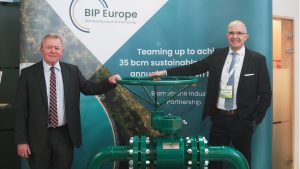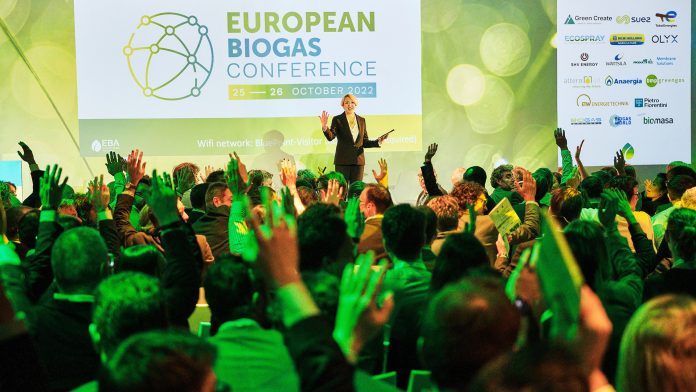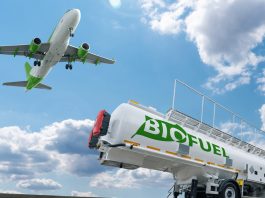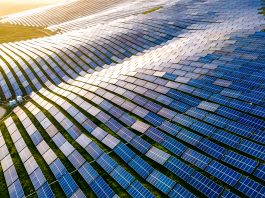Biogas and biomethane industries are providing today the cheapest and most scalable renewable gas made in Europe.
The biogas and biomethane industries are ready and fully committed to scale up the sector and produce at least 35 billion cubic metres (bcm) of biomethane by 2030.
“These industries are providing today the cheapest and most scalable renewable gas produced in Europe,” stressed Harmen Dekker, CEO of the European Biogas Association (EBA), during the closing ceremony of the European Biogas Conference held in October 2021 in Brussels.

Outcomes from the European Biogas Conference 2022
The 2022 event was sold out for the second time in a row. This edition was a platform for insightful discussions on how to scale-up the sector, based on the thought-provoking interventions of over 50 high-level speakers, including the Commissioner for Agriculture, Janusz Wojciechowski; the Head of Cabinet of the Commission’s Executive Vice-President, Diederik Samsom; the Deputy Director for DG Energy, Metchild Wörsdörfer; and the International Energy Agency (IEA).
Over 350 delegates, including policymakers, academia, industry representatives, and civil society organisations, enjoyed a two-day intensive programme addressing critical bottlenecks and opportunities for the sector. A key topic on the agenda was the sustainable achievement of the 35 bcm yearly biomethane production target by 2030. During his participation in one of the panels, Samsom urged the industry to be bolder and speak louder about the benefits, projects, and investments of the sector because Europe needs more sustainable biomethane and larger scale projects by 2030.
Giulia Cancian, EBA’s Secretary General, said: “The two-day conference was marked by an extraordinary level of commitment from the biogas and biomethane value chain to achieve the REPowerEU target for biomethane (35 bcm a year by 2030) and to do so sustainably. Landing the right policy framework at EU level remains paramount to support the growth of our sector. Achieving a market design fit for renewable gases, promoting a tech-neutral framework to green transport, closing the nutrient loop and fostering healthy soils, ensuring the roll out of biomethane capacity and untapping the potential of sustainable feedstocks are necessary steps towards climate neutrality.’’
First steps of the Biomethane Industrial Partnership
During the first day of the conference, Commissioner Wojciechowski announced the technical launch of the Biomethane Industrial Partnership (BIP). The initiative is aimed at supporting the achievement of the target to increase annual production and use of biomethane to 35 billion cubic meters by 2030. This is part of the REPowerEU package of urgent actions to mitigate the impact of rising energy prices, diversify gas supplies and accelerate the clean energy transition. Representatives involved in the BIP explained the setup of the five Task Forces that will steer the work of this partnership in the coming months.
The BIP was officially launched in September, during the European Sustainable Energy Week (EUSEW), by the European Commission’s Executive Vice-President, Frans Timmermans, and the Commissioner for Energy, Kadri Simson. The partnership will be “instrumental in ensuring an increase on annual production and use of biomethane to 35 billion cubic meters (bcm) by 2030”, recalled Vice President Timmermans. Meanwhile, Commissioner Simson invited “all stakeholders to overcome barriers for growth, share best practices and foster collaboration to rapidly increase biomethane in production and use.”
The deployment of biomethane will reduce Europe’s dependency on natural gas from Russia, which provided 40% of the EU gas supplies before the Ukraine war. At the same time, it will substantially contribute to an integrated net-zero energy system, diversifying farmers’ incomes and ensuring a circular approach. The potential to reach 35 bcm is already there, using feedstocks that do not displace food production or land use.
A domestic and mature renewable energy source
Europe has been producing biogas domestically for over 50 years, and the homegrown technologies for a rapid scale-up are fully mature. Today, the biogas and biomethane industries are feeding Europe’s energy supplies with 18 bcm of renewable gas coming from almost 20,000 local plants. This is similar to the entire natural gas consumption of Belgium, home to 11.5 million citizens and is saving 60Mt of CO2 equivalent, comparable to the amount of greenhouse gas (GHG) emissions produced by Sweden annually.
By 2030, the deployment of 35 bcm of biomethane in Europe will represent a substantial part of the EU gas demand, considering lower projected consumption thanks to diversification and energy savings. By 2050, the sector has the potential to produce up to 167 bcm of sustainable biomethane. The latest data from the European Biogas Association (EBA), to be released in the upcoming EBA Statistical Report 2022 at the end of November, shows that biomethane will be able to cover 35-62% of gas demand by 2050, assuming a reduced gas demand in 2050 of 271 bcm.
The potentials for 2030 can be reached by using waste from the food and farming sectors, as well as from municipal and industrial streams and sequential crops. 2050 estimates allocate significant potential to gasification technologies. With this full potential untapped, the biogas and biomethane sectors combined will create no less than 420,000 green jobs by 2030 and over one million jobs by 2050, according to EBA figures.

Streamlining domestic production
The partnership is part of a broader set of measures targeting the expansion of sustainable biomethane production and use, known as the Biomethane Action Plan annexed to the REPowerEU. This initiative includes a recommendation for all Member States to develop national biomethane strategies streamlining biomethane deployment and helping turn the 35 bcm target into reality.
So far, at national level, Germany is the largest biogas producer, but France is catching up rapidly, doubling domestic biomethane production in 2021. France promotes gas grid injection and is building a solid biomethane sector with a potential to produce 7 bcm by 2030. Italy is the third biogas producer in the EU with an ambitious biomethane support scheme that entered into force last month to support the rapid development of the sector based on the BiogasDoneRight model.
Apart from the top three producers, Northern Europe is also taking the lead on biomethane scale-up. Denmark is a frontrunner in the sector, with 25% of biomethane injected already today in the gas grid and a potential to cover all of it by 2034.
€83bn to build 5,000 plants
The cost of biomethane production is affordable. Estimations from ADEME, Gas for Climate and ENGIE show it can be produced at a cost of €57 – 66/MWh by 2050. This is especially true considering the current gas prices, which will remain high in the coming months. For the biomethane potential to be fully untapped, the sector needs investments. The EBA estimates that the industry will need €83bn up to 2030 to build 5,000 new plants and reach the 35 bcm target.
A quick ramp up will require additional measures, points out Harmen Dekker, CEO of the EBA.
He said: “The EU would need to fast-track permitting procedures for the development of new plants. Additionally, we need easy access to gas grid injection for biomethane producers and cross-border trade across Europe to gradually phase out fossil gas in a cost-efficient way.”
Embracing agroecology and circularity
Biomethane encompasses the energy and the agroecological transitions because a large share of the feedstocks used to produce biomethane comes from side streams of agricultural production, typically located in rural areas. This helps to diversify and de-risk the income of a struggling European farming sector, in need of sustainable and efficient business models which keep environmental conservation at their core.
Digestate is a co-product of biogas and biomethane production which can be used as organic fertiliser and offers an alternative to commonly used synthetic fertilisers. The EU imports between 15% and 70% of fertilisers from Russia, depending on the importing EU country. Furthermore, we can store in the soil 50-80% of carbon from digestate used as organic fertiliser. According to the latest IPCC report, carbon storage practices are central to mitigating climate change.
Additionally, the sector is a real opportunity for the exploitation of the biogenic CO2 market. From one ton of biogas, we obtain almost two tons of biogenic CO2. Today, the CO2 used as feedstock is mainly from fossil origin, obtained from the production of synthetic fertilisers, which is highly energy-intensive.
The production of synthetic fertilisers has plummeted due to the volatile gas price and CO2 is becoming harder to find, which causes a price hike. CO2 is one of the most useful industrial gases we have and the disruption in the CO2 supply chain is starting to hit many industries across Europe, which use this feedstock in soft drinks, food processing and packaging or for medical treatments, among others.
The BIP will be critical to make sure knowhow and best practices are shared across EU countries to accelerate biomethane development and increase the share of renewable energy produced in Europe.
About the author
Angela Sainz is the Communications Manager of the EBA. She co-ordinates the communication strategy of the association. She has worked in the communication unit of different European organisations and has spent the last ten years of her professional career in the energy sector. Her responsibilities include press relations, content editing, design of publications, management of EBA’s online presence, communication support to EU projects and organisation of events. Angela holds an Executive Master in Communication and EU Policies and a Master in Journalism from the Universitat de Valencia (Spain).
About the European Biogas Association (EBA)
The EBA is the voice of renewable gas in Europe. Founded in February 2009, the association is committed to the active promotion of the deployment of sustainable biogas and biomethane production and use throughout the continent. The association counts today on a well-established network representing the whole biogas and biomethane value chain.
Angela Sainz Arnau
Communications Manager
European Biogas Association
Please note, this article will also appear in the twelfth edition of our quarterly publication.









